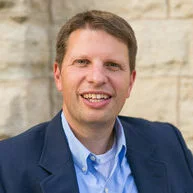In Letters to Malcolm: Chiefly on Prayer, C.S. Lewis speaks to the fact that Christians must recognize God in the everyday matters of life, not only in explicitly sacred settings: “We may ignore, but we can nowhere evade, the presence of God,” he suggested. “The world is crowded with Him. He walks everywhere incognito. And the incognito is not always hard to penetrate. The real labor is to attend. In fact, to come awake. Still more, to remain awake.”C.S. Lewis, Letters to Malcom: Chiefly on Prayer (New York: Hardcourt Brace & Company, 1964), 75.
To “come awake” and “remain awake” to spiritual things, however, is not a simple matter, especially for emerging adults in our fast-paced and often frenetic culture. For twentysomethings, digital natives who have grown up in a world flooded with distractions, attentiveness to God and his work is seemingly threatened on every front. In such a context, it can seem nearly impossible to observe the apostle Paul’s radical call to “fix our eyes not on what is seen, but on what is unseen” (2 Cor 4:18).
In this post, I would like to look at some of the chief forces preserving a kind of spiritual slumber during these years, focusing on the multiplication of opportunities, various life distractions, the feeling of “temporary” existence, and, for students in Christian institutions, the dulling effects of a God-saturated environment. While there are many other sources of spiritual apathy during emerging adulthood, these remain some of the most critical. In a series of follow-up posts, I will suggest some ways of fostering postures of spiritual attentiveness among those in this age group. In other words, how do we help emerging adults remain “awake” to the presence and work of God in their lives in the face of these distractions?
Multiplication of Possibilities
Back in 2008, University of Virginia English professor Mark Edmundson wrote a provocative article for the Chronicle of Higher Education documenting his thoughts about the rising generation of American college students. His primary conclusion was that students were consumed with a vigorous passion for life. “They want to study, travel, make friends, make more friends, read everything (superfast), take in all the movies, listen to every hot band, keep up with everyone they’ve ever known,” he suggested. More to the point, he argued that their chief desire was to “multiply possibilities.” “For as much as they want to do and actually manage to do,” he claimed, “they always strive to keep their options open, never to shut possibilities down before they have to.”Mark Edmundson, “Dwelling in Possibilities,” Chronicle of Higher Education 54, no. 27 (March 14, 2008): 7.
Emerging adults’ desire to multiply possibilities can be seen in a number of venues. In the academic arena, Edmundson cited students’ proclivity to take multiple majors and seek many potential career options. Since students want to keep all vocational possibilities open, in other words, they expand the range of areas they may study and jobs they may pursue. In the social arena, he observed that students rarely commit to focused entertainment plans, leaving options open until the last minute to make sure they know all possibilities (and even then remaining tethered to cell phones in case other options arise). In the domain of sexuality, hookup culture highlights continual variety in sexual partners, coupled with a disdain for being tied down to a particular person. They want to experience all that life has to offer—every trip, every discussion, every event, every song, every show. And all of this is fueled by drugs (Ritalin, Adderall, etc.) and energy drinks that keep them moving and experiencing life beyond normal bodily limitations. Propelled by a continual fear of missing out on something, they remain like an engine perpetually revving, providing little space for rest, reflection, and consideration of the work of God in the world and in their own lives.
Much of this, of course, is powered by technology. The Internet exists to multiply possibilities, ever increasing options for shopping, connecting, viewing, and exploring. Emerging adults know more about the events, gatherings, shows, parties, trips, and opportunities that exist in their sphere, forcing them to deliberate over options that previously would have been unknown. In addition, as Nicolas Carr claims in his book The Shallows, the internet trains the brain for skimming and browsing—perpetual hyperlinking—rather than concentrated and sustained thought.Nicholas Carr, The Shallows: What the Internet is Doing to Our Brains (New York: W.W. Norton & Company, 2011). While cell phones preserve connections with individuals in a variety of locations, they may also compromise the ability to be fully present in any one place. Many emerging adults prefer virtual dispersion to embodied and situated connections with God, people, and texts. Media technologies—think Spotify and Netflix—proliferate the number of options for listening and watching. Social networking sites expand the number of potential conversation partners. In an “always connected” world with 24/7 access to news, entertainment, and personal connections, they are likely to lack spaces conducive to sustained focus on God (without the continual buzz of a new message or post!) and his word. As possibilities multiply and flood the perceptual horizon, quiet spaces of solitude and silence become rare commodities indeed.On these themes, see Christian Smith, Souls in Transition: The Religious and Spiritual Lives of Emerging Adults (New York: Oxford University Press, 2009), 47.
Life Distractions
In emerging adulthood, this is only intensified by what Tim Clydesdale has termed “daily life management,” the need to juggle academic or job responsibilities, new life tasks such as setting up bank accounts and paying bills, local and distant relationships, and opportunities for fun.Tim Clydesdale, The First Year Out: Understanding American Teens After High School (Chicago: The University of Chicago Press, 2007), 3. Many of these tasks are new and so take a good deal of time and energy. In addition, they tend to be the very things that are urgent (in terms of having associated deadlines) and immediately rewarded (or punished), thus elevating them on the priority scale. It is not surprising that such distractions can readily generate work-hard, play-hard rhythms of life that move in whiplash fashion from task completion to blowing off steam. It is also not surprising that such a setting can quickly compromise spiritual attentiveness, pushing things like spiritual disciplines, small groups, and church attendance to the back burner. Spiritual intentionality has no deadline and few immediate and tangible rewards. Unlike other tasks, emerging adults rarely have people evaluating them for their devotion in these areas. As Clydesdale suggests, the norm as students enter college is to place important aspects of their identity—including a faith identity—in a lockbox, stowed away for safe keeping until a later time when they will (supposedly!) have more space to re-engage such concerns.Tim Clydesdale, The First Year Out: Understanding American Teens After High School (Chicago: The University Of Chicago Press, 2007), 4.
The “Perpetual Temporary”
Attentiveness is also threatened at this time of life by the psychological posture of the “perpetual temporary.” Emerging adulthood is by any measure a time of transience. Whether in college, graduate school, or early career, this time of life is often characterized by constant moving, shifting relationships, and changing jobs. In such a context, it is easy to see why emerging adults resist careful attentiveness to spiritual practices, church attendance, mentoring relationships, and many of the other core dimensions of the Christian life. It can feel futile to really invest deeply in such things when they will encounter yet another move in the near future. I have many conversations with students that begin with, “When I am finally done with college and settled…” or “When I finally get married and settled….” Many feel that they are postponing spiritual attentiveness until a time in life when geographical and relational stability will provide the necessary time and space for deep spiritual investment. What they often fail to realize is that the patterns of the present are establishing habits that will be challenging to revise even when life is more settled in the future (not to mention the fact that life rarely becomes settled in the way they imagine).
Environment
One’s context, of course, can simply enhance spiritual inattentiveness. In more typically secular settings, such as public universities or work environments, the absence of a Godward focus can foster a kind of blindness to spiritual things, especially if Christian fellowship is absent. Yet students in Christian institutions and those who take up explicitly Christian vocations are not immune to this spiritual malaise. When God is all around—in classes, in assignments, in chapel services, etc.—a posture of spiritual attentiveness can sometimes be compromised due to oversaturation. Those in such settings may engage a kind of spiritual cruise control, coasting along within the spiritual stream. Part of this, of course, can come from the sheer reality of converting spirituality to an area of academic study or a “job.” Yet it is also a function of a kind of false security that makes one feel spiritually engaged just by virtue of religious surroundings. The words of Puritan Richard Baxter spoken to pastors are particularly poignant here:
A graceless, inexperienced preacher is one of the most unhappy creatures upon earth and yet he is ordinarily very insensible of his unhappiness; for he hath so many counters that seem like the gold of saving grace, and so many splendid stones that resemble Christian jewels, that he is seldom troubled with the thoughts of his poverty; but thinks he is ‘rich, and increased in goods, and stands in need of nothing, when he is poor, and miserable, and blind, and naked.’ He is acquainted with the Holy Scriptures, he is exercised in holy duties, he liveth not in open disgraceful sin, he serveth at God’s altar, he reproveth other men’s faults, and preacheth up holiness both of heart and life; and how can this man choose but be holy? Oh what aggravated misery is this, to perish in the midst of plenty! – to famish with the bread of life in our hands, while we offer it to others, and urge it on them! That those ordinances of God should be the occasion of our delusion, which are instituted to be the means of our conviction and salvation!Richard Baxter, The Reformed Pastor (Carlisle, PA: Banner of Truth Trust, 1974; Original work published 1656), 54-55.
Those who work with emerging adults in such settings would do well to be aware of the muffling effects of spiritual saturation and to encourage emerging adults to remain awake in such settings. Environmental and institutional Christianity cannot take the place of a real, vital, and engaged relationship with the Lord of the universe.
While every phase of life comes with its own sources of spiritual slumber, these emerging adult issues establish habits and rhythms that carry throughout the rest of the life span. Emerging adult pastors, chaplains, student development workers, and parents are well positioned to help twentysomethings stay awake spiritually at this critical time. Many forces will be acting to dull their sensitivities to God’s word and work. Emerging adult mentors, however, can keep them alert and watchful, responsive to God’s still small voice. I will share in future posts some of the ways I have seen this done most effectively. The stakes are high for the church, the world, and for emerging adults themselves. May we together embrace this all-important task!





Comments
Be the first one to make a comment!